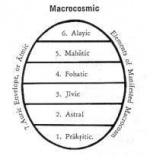Ālaya
Ālaya (devanāgarī: आलय) is a Sanskrit word meaning "abode, dwelling." In the Yogacara school of Buddhism it is usually employed in connection with the word vijñāna (consciousness) as ālayavijñāna ("store-house consciousness"). In Theosophy it refers to the sixth universal principle, the universal soul.
In Buddhism
In the tradition of the Yogacara school of Buddhism, ālayavijñāna is regarded as the eight consciousness (aṣṭa vijñāna). The first five consciousnesses are the ones derived from the senses (eye, ear, nose, tongue, and body or skin). Then come two kinds of mental consciousnesses ("of ideation" and "of obscuration"), and finally the "store-house consciousness" or "causal consciousness". This is the basis of the other seven, which are "evolving" or "transforming".
The store-house consciousness accumulates all potential energy for the mental and physical manifestation of one's existence. It is the storehouse-consciousness which induces transmigration or rebirth, causing the origination of a new existence.
In Theosophy
H. P. Blavatsky defined ālaya as follows:
The Universal Soul (See Secret Doctrine Vol. I. pp. 47 et seq.). The name belongs to the Tibetan system of the contemplative Mahâyâna School. Identical with Âkâsa in its mystic sense, and with Mûlaprakriti, in its essence, as it is the basis or root of all things.[1]
When describing the cosmic planes, Mme. Blavatsky makes ālaya the sixth. In the quote above she says that it is identical with ākāśa (the fifth cosmic principle) "in its mystic sense." Mūlaprakṛti, being ālaya's essence, can be regarded as the seventh cosmic principle. All this on the side of matter or substance.
Mahat, the Universal Mind, is said to be the manvantaric aspect of alaya, the Universal Soul.[2] And just as the sixth and fifth principles in human beings (buddhi and manas) are frequently referred to as working together, we find similar references applied to these cosmic principles, such as the phrases Alaya-Akasha[3] or Alaya-Mahat.[4]
The terms anima mundi and over-soul[5] are frequently used as a synonym for ālaya.
The Master Soul
Man's sixth principle buddhi is regarded as a ray of the Universal Soul.[6] In mystical treatises such as The Voice of the Silence ālaya is said to be the "Master-Soul", in whom the mystic has to dwell:
Of teachers there are many; the MASTER-SOUL is one, Alaya, the Universal Soul. Live in that MASTER as Its ray in thee. Live in thy fellows as they live in It.[7]
However, although ālaya is in every human being, very few are able to get in touch with it:
Alas, alas, that all men should possess Alaya, be one with the great Soul, and that possessing it, Alaya should so little avail them!
Behold how like the moon, reflected in the tranquil waves, Alaya is reflected by the small and by the great, is mirrored in the tiniest atoms, yet fails to reach the heart of all. Alas, that so few men should profit by the gift, the priceless boon of learning truth, the right perception of existing things, the Knowledge of the non-existent![8]
The difficulty lies in the fact that ālaya can only be reflected in the "passionless Dharmakāya intellect":
Âlaya, or Nying-po, being the root and basis of all, invisible and incomprehensible to human eye and intellect, it can reflect only its reflection—not Itself. Thus that reflection will be mirrored like the moon in tranquil and clear water only in the passionless Dharmakâya intellect, and will be distorted by the flitting image of everything perceived in a mind that is itself liable to be disturbed.[9]
The ultimate aim of the mystic is "to be able to identify himself with and to merge himself into it":[10]
Notes
- ↑ Helena Petrovna Blavatsky, The Theosophical Glossary (Krotona, CA: Theosophical Publishing House, 1973), 14.
- ↑ Helena Petrovna Blavatsky, Collected Writings vol. XII (Wheaton, IL: Theosophical Publishing House, 1980), 636.
- ↑ Helena Petrovna Blavatsky, Collected Writings vol. XII (Wheaton, IL: Theosophical Publishing House, 1980), 371.
- ↑ Helena Petrovna Blavatsky, Collected Writings vol. XII (Wheaton, IL: Theosophical Publishing House, 1980), 313.
- ↑ Helena Petrovna Blavatsky, The Theosophical Glossary (Krotona, CA: Theosophical Publishing House, 1980), 48.
- ↑ Helena Petrovna Blavatsky, Collected Writings vol. XII (Wheaton, IL: Theosophical Publishing House, 1988), 607.
- ↑ Helena Petrovna Blavatsky, The Voice of the Silence (Adyar, Madras: Theosophical Publishing House, 1992), 49-50.
- ↑ Helena Petrovna Blavatsky, The Voice of the Silence (Adyar, Madras: Theosophical Publishing House, 1992), 24.
- ↑ Helena Petrovna Blavatsky, Collected Writings vol. XIV (Wheaton, IL: Theosophical Publishing House, 1995), 439.
- ↑ Helena Petrovna Blavatsky, The Voice of the Silence (Adyar, Madras: Theosophical Publishing House, 1992), 88.
Further reading
- Ālaya at Theosopedia
